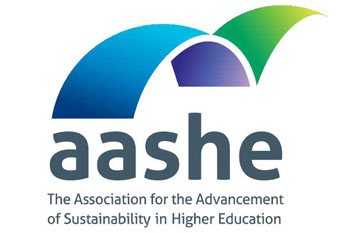UWG Recognized for Commitment to Sustainability
By Julie Lineback
The University of West Georgia recently earned a bronze star rating from the Association for the Advancement of Sustainability in Higher Education’s Sustainability Tracking, Assessment, and Rating System (STARS). The award is the most recent accolade received by UWG reflecting its increased commitment to renewable resources.
 The reporting process began as an effort to benchmark and assess the university’s commitment to environmental, social, and economic sustainability.
The reporting process began as an effort to benchmark and assess the university’s commitment to environmental, social, and economic sustainability.
“The point of sustainability ensures that we use our resource at all different levels in such a way that future generations will be able to have the same opportunities that we have today,” said Assistant Vice President of Campus Planning and Facilities Brendan Bowen.
The evaluation process focused on five key areas: academics, engagement, operations, planning and administration, and innovation. Full credit was received for undergraduate programs, recognizing UWG’s sustainability-focused programs such as the geosciences curriculum and the Southwire Sustainable Business Honors Program. The formation of the UWG Sustainability Council, along with the inclusion of sustainability in the university’s strategic imperatives, helped to boost the coordination, planning, and governance rating to a near perfect score.
“Usually when you think of sustainability you think of environmental sustainability, but there’s also a social aspect to it,” said Associate Professor of Geosciences and Director of Sustainability Dr. Hannes Gerhardt. “It’s not just focused on grounds and buildings. It’s also focused on diversity and equality.”
The university received full credit for its student life and outreach campaigns. Earlier this year, UWG placed #1 in RecycleMania, a national initiative that saw colleges all over the country compete to collect the largest amount of recyclable waste in categories based on school size. The result of this year's RecycleMania was a 10% increase in recycled materials collected over the two-month period compared to the same period last year.
In addition to emphasizing the accomplishments of UWG’s sustainability efforts, the report also highlighted areas in need of improvement, which included building energy consumption.
“We received an award this year from Georgia Energy Challenge that we finished way ahead of schedule,” Brendan explained. “We reduced our consumption by 15 percent six years earlier than scheduled. Despite that, we added so many buildings and grew so fast, it put us a little upside down on energy consumption.”
Transportation was another area that should show progress in the future. While the University System of Georgia and UWG have a policy on telecommuting for employees, and the university recently purchased a car charging station for drivers of electric vehicles, Dr. Gerhardt said strides still have to be made.
“We did a survey on how students get to campus, and there were some encouraging things there, like bus usage,” he acknowledged. “However, there were some things not as encouraging, like bicycle usage, which we’re working on right now.”
The Department of Facilities and Grounds is also piloting a low-impact, ecological cleaning program. Custodial Services is now producing cleaning solutions on-site by using pool salt, water and electricity. They will no longer be receiving shipments, which generate cardboard or plastic, and it will also reduce hazardous waste generation.
The university will be bronze certified for three years and will renew in 2018. Both Dr. Gerhardt and Brendan are optimistic that a silver rating will be achieved by picking up more credits while not losing track of the ones already received.
“It becomes a scorecard we can use to track progress,” Brendan explained. “It’s really well aligned with President Kyle Marrero’s strategic plan and the idea of developing outcome-based strategies.”
It was the value of collaboration, he said, that was the best part of the experience. Every division approached sustainability from different directions and perspectives.
“We’re all effected by this,” Dr. Gerhardt concluded. “Everyone had to pull on the same rope to make this happen, and they did.”
To read the AASHE STARS full report, visit https://stars.aashe.org/institutions/university-of-west-georgia-ga/report/2015-04-20/.
To learn more about the UWG Sustainability Council and what you can do to assist UWG in its green efforts, visit http://www.westga.edu/green/index.php.
Do you have a comment or opinion about this story's topic? Perspective Online wants to hear from you. Submit a letter to the editor today.
